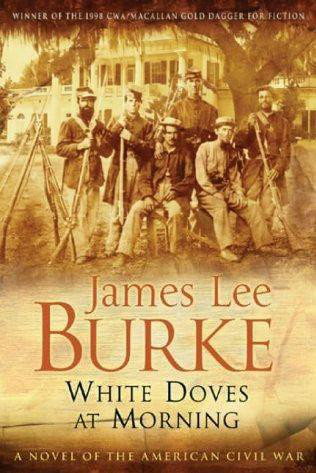
White Doves at Morning
A Novel
کتاب های مرتبط
- اطلاعات
- نقد و بررسی
- دیدگاه کاربران
نقد و بررسی

October 14, 2002
Following the publication of his 11th Dave Robicheaux thriller, bestselling Burke (Bitterroot; Purple Cane Road) keeps the action in Louisiana, turning back the clock to the Civil War. Central to this brooding saga are hotheaded young idealist Willie Burke, son of a boardinghouse owner, and a beautiful slave girl named Flower Jamison. She is the illegitimate daughter of Ira Jamison, the callous owner of the infamous Angola Plantation. Flower's mother was murdered by a brutal overseer, Rufus Atkins, just after she gave birth, and Rufus has been a malevolent presence in Flower's life ever since. Secretly taught to read and write by Willie Burke, she now does laundry for the town brothel. Befriended by Abigail Dowling, a young Yankee abolitionist who is helping slaves escape the South, Flower clings to the hope that Jamison will acknowledge her as his daughter; meanwhile, Jamison has his eye on Abigail. The war gets into full swing, and Willie loses his best friend at Shiloh because of Jamison's cowardly dereliction. Wounded and left to die, Willie is saved by Abigail, who brings him home and nurses him back to health. Against her protests, he attempts to return to battle but is taken captive and—the war now over—escapes to confront racist vigilantes intent on shutting down Flower's school for ex-slaves. Burke has created a cast of strong, if somewhat stereotypical, characters; readers will warm to outspoken, irrepressible Willie as much as they deplore the evil Atkins. Although at times a bit forced, this moving morality play shows a different dimension of this gifted writer. Agent, Phillip Spitzer.(Nov.)Forecast:Fans of John Jakes will particularly enjoy this rare historical offering from Burke.

October 15, 2002
In a departure from his mystery novels featuring Dave Robicheaux and Billy Bob Holland, Burke describes New Iberia, LA, during the Civil War and Reconstruction. Young Willie Burke (an ancestor of the author) and two friends join the Confederate army despite their doubts about some aspects of the Cause, while in New Iberia Abigail Dowling, a nurse from Massachusetts, struggles to act on her abolitionist beliefs. Abigail befriends Flower, a young slave who has been secretly taught to read by Willie, and thus angers plantation owner Ira Jamison (Flower's owner and biological father) and his overseer. In lyrical and evocative prose, Burke depicts both the boredom and horror of army life and the injustices visited upon blacks and poor whites by the "haves" in Southern society. He starkly conveys the desperation felt by those who have no power or voice and vividly creates a sense of place and character. This novel parallels Paulette Jiles's successful Enemy Women in its literary quality and use of family stories for background, but diehard fans of Burke's mysteries may not be interested. Recommended for medium and large public libraries and where Civil War novels are popular. [Previewed in Prepub Alert, LJ 7/02.]-Ann Fleury, Tampa-Hillsborough Cty. P.L., FL

September 15, 2002
Burke, best known as the whip-smart crime fiction writer who writes both the long-running Dave Robicheaux series and the newer Billy Bob Holland series, has a more ambitious reason for visiting the familiar turf of New Iberia, Louisiana: a Civil War epic. Drawing on his own family history as well as broader historical record, the author centers a constellation of characters around Willie Burke, a reluctant Confederate soldier who finds a skill for killing; Abigail Dowling, the abolitionist he loves; Flower, the slave girl he teaches to read; Ira Jamison, a southern aristocrat and Flower's father; and sundry friends, enemies, gunrunners, madams, and hired thugs. It's an epic filmed in tight focus, however, taking us from secession to Reconstruction at an intensely personal level. Young soldiers fight shell shock, and slaveholders search for new methods of exploitation while their former slaves struggle to find spiritual emancipation. In addition to a new theme--the power of literacy--Burke continues to explore his favorite themes, including the persistence of the past, the attraction of decent people to violence, and the ethics of protecting the weak. Despite a few literary tics, his masterful phrasing still wonderfully evokes atmosphere and action. But he also slips into cliche (one character is both left for dead " and" escapes from a firing squad) and dilutes his story with too-explicit interior passages and dialogue. Perhaps when Burke feels more comfortable with historical fiction, he'll find the easy rhythms and peppery notes that make the rest of his writing so great.(Reprinted with permission of Booklist, copyright 2002, American Library Association.)

























دیدگاه کاربران